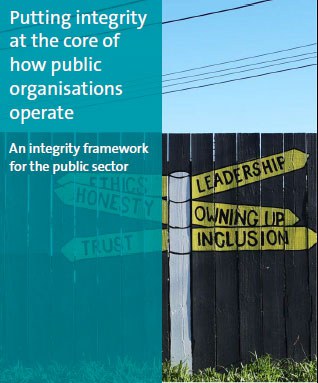Assurance and accountability
Why it matters: Builds trust through transparent scrutiny
Assurance activities support building trust into the integrity system. Trust comes from providing those in governing roles and the public with confidence that an organisation is transparent about its performance in relation to integrity and taking appropriate actions to address issues or make improvements, where required.
The addition of two new overarching strategic commitments [equity measures] in our accountability documents ... We are more explicit in these documents about the journey we are on as an organisation, our role in the community, and the need to continue to develop and foster enduring relationships with iwi.”
Crown entity staff member
What it looks like: Adequate independent oversight "of the whole" by those charged with governance
Public organisations should account both internally and externally for the design and operation of the internal integrity environment. Measuring and reporting progress (building block 8) is beneficial only if it then feeds into the planning, reporting, and assurance processes set up to monitor, improve, and account for an organisation's activities and risks.
Internally, this means that there is regular reporting and discussion at a governance level on the organisation's integrity system and culture. Those in charge of governance should be able to regularly monitor how the organisation is behaving as well as what functions it is delivering, by considering the extent to which the organisation's values, the design and operation of its internal controls, and the behaviour of its staff are all aligned. It is also important that these governance discussions include a focus on incidents or examples where behaviour in the organisation does not reinforce its values (and what changes are required as a result).
The New Zealand Customs Service includes indicators about its ongoing programme to safeguard integrity and prevent corruption in its annual report. The information includes data on the outcomes of investigations into allegations of unacceptable behaviour and what type of corrective action was needed.
Office of the Auditor-General (2019), The problems, progress, and potential of performance reporting
An organisation's internal audit function can play an important role in providing those charged with governance with independent assurance over the internal integrity system. It is also important to connect with the organisation's risk management processes and consider the role of the audit and risk committee.
Management reporting processes are important and need to regularly inform staff about integrity discussions or decisions at the governance level, so there is visibility and understanding of the agreed activities and their outcome.
Public organisations should also account externally for their integrity. By doing so, they acknowledge the importance of integrity to their external stakeholders and maintain the public's trust and confidence.
Where public organisations are spending public money, collecting and using personal information, or exercising coercive powers, it is essential to give the public assurance that integrity is safeguarded. An external account, such as describing the types and outcomes of integrity investigations in an annual report, gives interested members of Parliament and the public insight into the design and operation of the integrity system in public organisations.
 |
It's worth considering...
|


